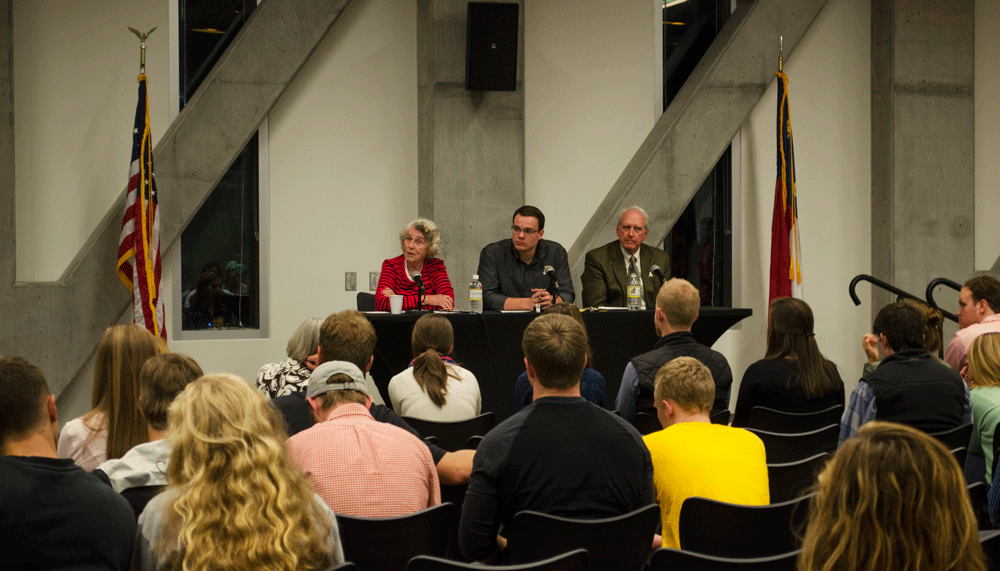On Monday, two former members of Congress visited campus and spoke to SGA and the community about their experiences. The event was called Coffee with Congress and was open to the public.
The Appalachian sat down with Beverly Bryon, democratic representative from Western Maryland from 1978 to 1992 and Dan Miller, member of the
Republican party, who represented the 13th Congressional district of Florida for 10 years.

The Appalachian: What is the main message you hope to get across to students while here?
Dan Miller: Public service is worthwhile, to be willing to get involved in your community at this local level, the federal level, the state level. Participating in the processes – you can’t just sit back and say ‘oh I don’t like it, this stinks,’ and such. You may not like it, but it’s going to continue that way unless people get involved.
Beverly Byron: One thing that I try to leave the students with is a message that you can’t complain unless you participate and it is so vitally important that the young people in this day and age, that are pressured from all different directions, do take the time to vote, and do take the time to register and participate because if it’s nothing more than participating in a local election where you can become involved, that’s important. It’s the groundwork for politics.
TA: Appalachian State has been denied an early voting site on campus by the State Board of Elections, thus making it harder for students to be civically engaged. Do you have any advice for students on how to deal with that?
DM: Make a fuss about it and that’s how you get their attention. Obviously it’s a local and state issues, not a federal issue, but people need to create a fuss about it. Say ‘this is not right,’ and you don’t need to protest, but you may need to do that. Raise the issue because it’s a fairness issue – it makes sense to me. Assuming there’s not much cost involved, then it’s something that’s not hard to justify.”
TA: What was the reason you decided to take the step to run for Congressional office?
DM: I was never in politics, but I got mad at government and I thought we spent too much, it was too big, and [it] was going into the debt that was immoral for the younger generation. I ran as a fiscal conservative and that’s what I focused on in my 10 years in Congress.”
BB: My first husband was a member [of Congress] and died the eleventh of October. I was nominated by the state two days later to run for an election in November.
TA: What is your favorite personal accomplishment from when you held office?
DM: I like to think it’s working together on a lot of issues. We balanced the budget while I was there, and no one person takes credit for it, but that’s really what I’m most proud of. We paid down the debt for four years in a row back in the 1990s. People forget that you can run surpluses in Washington [D.C.]. Being part of that process, being on the budget committee for a number of years and the appropriations committee for a number of years, I felt I was an active part of that process – no one person can take credit for it though.
BB: A lot of them. A lot of little things that you could have the capability of getting done for individuals that are not earthshaking, but to the individual or to that family, makes a tremendous difference. As far as legislation is concerned, I am probably most proud of the American Discovery Trail, the Rails to Trail Legislation, the work I did on the interior committee. On Armed Services, a health care legislation, gender neutral combat aircraft, many of the issues we had under the DOD (Department of Defense) were personnel issues.
TA: What was the most difficult or controversial event to happen while you were in office?
DM: The most difficult thing was 9/11. I was there that day. The events following that has to be the number one issue.
BB: I won’t exactly say that there were difficult or controversial things, we didn’t have one major issue, but we had the vote for Desert Storm, which was after a very in-depth, outstanding debate on the floor of the House. I looked at interaction with many leaders in numerous countries of the free world, which was a lot of work.
Story: Nicole Caporaso, News Reporter
Photo: Morgan Cook, Photo Editor
